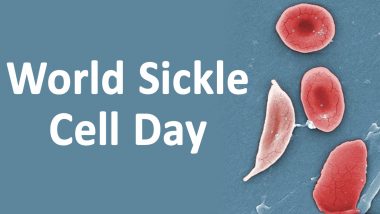World Sickle Cell Day is celebrated every year on June 19 to increase awareness about the genetic disease Sickle Cell Disease(SCD), very commonly found in people from Africa, South America, Central America, Saudi Arabia, India, Turkey, Greece and Italy. The day helps more and more people understand the condition and encourage organisations to contribute towards collecting funds for poor patients and in other ways, like organising events, etc. SCD is a major public health concern and it is important to encourage everyone to understand the objective of World Sickle Cell Day, which is to raise awareness about the SCD and support sickle cell patients.
World Sickle Cell Day History And Significance
The 19th June is World Sickle Cell Day and this year the Sickle Cell Society is celebrating 40 years of working in the sickle cell community. World Sickle Cell Day is a United Nation's recognised day to raise awareness of sickle cell at a national and international level.
What is Sickle cell disease (SCD)? Its Symptoms & Treatment
In the year 2015, it was found out that 114,800 deaths occur due to Sickle cell disease (SCD). It is an umbrella term given to a group of blood disorders typically inherited from a person's parents. The most common type is known as sickle cell anaemia (SCA). It results in an abnormality in the oxygen-carrying protein haemoglobin found in red blood cells. A group of disorders that cause red blood cells to become misshapen and break down. With sickle cell disease, an inherited group of disorders, red blood cells contort into a sickle shape. The cells die early, leaving a shortage of healthy red blood cells (sickle cell anaemia) and can block blood flow causing pain (sickle cell crisis). Infections, pain and fatigue are symptoms of sickle cell disease. Treatments include medication, blood transfusions and rarely a bone-marrow transplant. People with sickle cell are also at risk of complications stroke, acute chest syndrome, blindness, bone damage and priapism (a persistent, painful erection of the penis).
Over time people with sickle cell can experience damage to organs such as the liver, kidney, lungs, heart and spleen. Death can also result from complications of the disorder. Treatment of sickle cell mostly focuses on preventing and treating complications.
(The above story first appeared on LatestLY on Jun 18, 2020 05:00 PM IST. For more news and updates on politics, world, sports, entertainment and lifestyle, log on to our website latestly.com).












 Quickly
Quickly



















